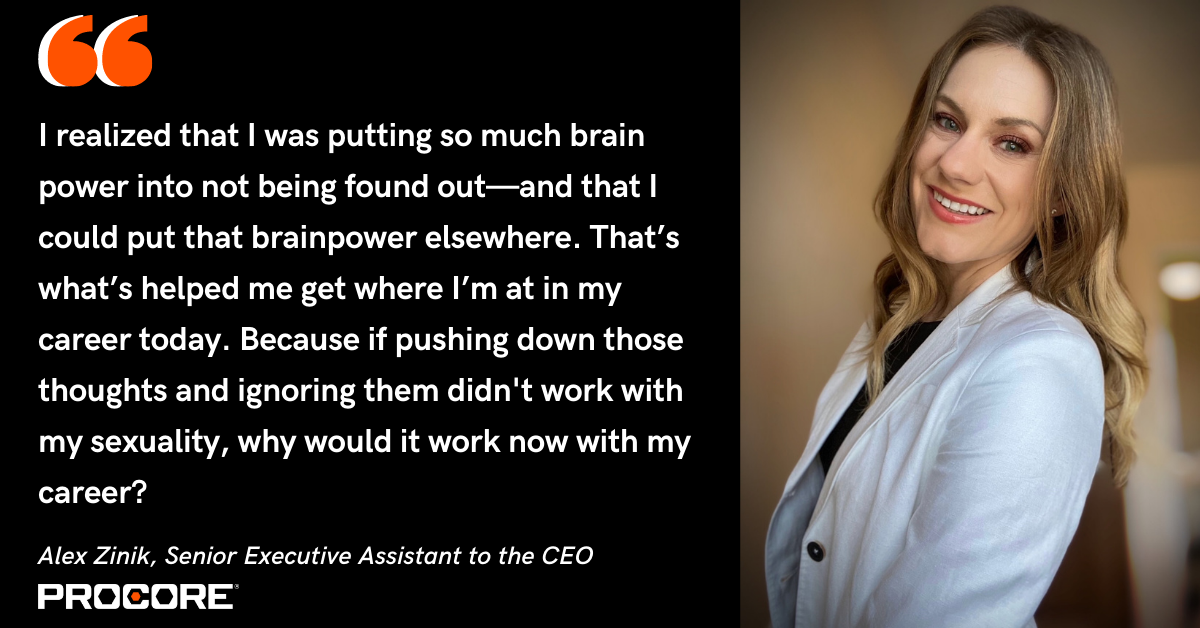Alex Zinik wasn't surprised that she started her career in education—she decided she would become a teacher when she was just in third grade.
She was surprised while working as a paraeducator in the school system and preparing to become a special education teacher, she discovered that it didn't feel quite right. "I didn't know if that's what I really wanted to do," she recalls.
So a friend suggested she take a job during her off summers at construction software company Procore. She thought this would be the perfect opportunity to try out this new challenge, and if she needed to, she could go back to the school district once the summer was over.
"Five summers later, I'm still here!" she says, smiling. "And I see myself here for many more years. I just fell in love with the company, the culture, and with the career growth opportunities I was presented with."
As part of our Pride month celebrations, Alex, currently the Senior Executive Assistant to the CEO at Procore, sat down with us to share how a common fear—the fear of being found out—underlay the imposter syndrome she felt when pivoting to an industry in which she lacked experience, and the anxiety she often felt before coming out to her friends and family about her sexuality.
Read on for her insight on overcoming negative thought patterns, being yourself, and paying it forward.
Recognizing patterns when working to fit in
Alex first learned about imposter syndrome—an internal experience of believing that you are not as competent as others perceive you to be—a few years ago. She was immediately struck with a sensation of feeling less alone—of recognizing that there was a name for what she'd been experiencing on the job.
"Imagine being part of a group where you're told your whole life that you're not good enough, or that you don't fit in, because of your skin color or your sexuality," she says. "It's so important to understand that we're not suffering through this alone. Imposter syndrome is way more common than we think it is, and it's so important to be open about it."
As she read more about it, Alex recognized signs of imposter syndrome in her day-to-day work: feeling shy presenting her work to stakeholders or avoiding using technical terms for fear someone would think she didn't know what they meant.
"I realized I would try to shove the thoughts down and avoid putting myself in certain situations at work," she says. "That was actually a lot like how I used to treat my sexuality before I was open about it. And I realized that I was putting so much brain power into not being found out—and that I could put that brainpower elsewhere. That's what's helped me get where I am in my career today. Because if pushing down those thoughts and ignoring them didn't work with my sexuality, why would it work now with my career?"
Leaning in to opportunities to be herself
Two mentors have played a big role in guiding Alex's career thus far.. First is Suzanne Mayeur, Procore's VP of Special Projects. She hired Alex, gave her her first stretch project (collecting data on improving the company's shuttle and parking services), and guided her through her first promotion into a travel role. Michael Denari, Procore's Director of Procurement, also supported her career growth at Procore. He taught her how to run Excel reports, gave her opportunities to present to executives, and supported her pursuit of project management certification.
"When I was a kid in high school and college, I didn't really ever have that passion for what I wanted to do," says Alex. "I never studied harder for anything in my life than I did for that project management test!"
She passed on her first try, and enjoyed working in program and project management within Procore's procurement team until Suzanne reached back out with an opportunity to support Tooey Courtemanche, Procore's CEO.
"It was so scary to think about," says Alex. "I was really comfortable in my position in procurement and I felt like I was in a really good place in my career." The imposter syndrome she'd dealt with earlier in her career almost kept her from taking the job. "I spent a lot of time asking, 'Am I good enough? Do I have the right qualifications? Will everybody find out that I only have teaching experience under my belt?'"
But Alex remembered what she had learned: that she had power over her own thought patterns, and that she could redirect them. "I said, 'I am good enough. In fact, I am going to use what I've learned to accomplish more and continue to grow in my career.'"
She took the job, and now loves all aspects of managing the office of the CEO—especially the opportunity to study Tooey's leadership style.
"I spend day in and day out with him. And one thing I admire is that he never changes based on his audience," says Alex. "He's the same Tooey we all know whether he's talking to a new hire he runs into in the parking lot or whether he's talking to investors on Wall Street. He's himself, he's proud of who he is, he's open about his story. He embraces who he is and he's authentic, and that's a good reminder."
Creating opportunities for others
In Alex's past jobs, she didn't feel comfortable being out as her authentic self. "My coworkers would assume I was straight...I would try to blend in and stay under the radar. I used to get extreme anxiety whenever one of my coworkers would ask me personal questions. Because how could I tell them about the awesome weekend I just had with my girlfriend?" she says.
That's not the case at Procore. She's been out since she joined the company. "As soon as I stepped foot in Procore, I was like, 'Oh my gosh, I can be out here; I can say 'my girlfriend and I'; I don't have to hide who I am.' Everyone was so welcoming and so supportive," says Alex.
Now, Alex is working to make sure that Procore stays a safe and supportive place for everyone. She's spoken about Pride on Procore's All Company Update calls and currently serves as the co-chair for Procore's PRISM (Pride Raising Awareness, Involvement, Support, and Mentoring) employee resource group for LGBTQIA+ employees and allies. With PRISM, she helps host events and create volunteer opportunities, and partners with other ERGs, including Procore's African (Descent) Council, to support allyship across identities.
As part of Procore's June Pride month celebrations, Alex is hosting a Daring Conversations episode about the never-ending process of coming out, and celebrating with virtual events across Procore campuses. Personally, she's celebrating her first Pride with her now-fiancé (Alex's girlfriend recently proposed to her!).
"I want my fellow LGBTQIA+ employees to know that not only am I part of this community, but I'm an ally to them. If I can do my part by being out and open, I want to; I want to promote psychological safety as much as I can, and make a positive impact where I can," she says.
If Procore's culture sounds like one you can get behind, check out their open roles!



